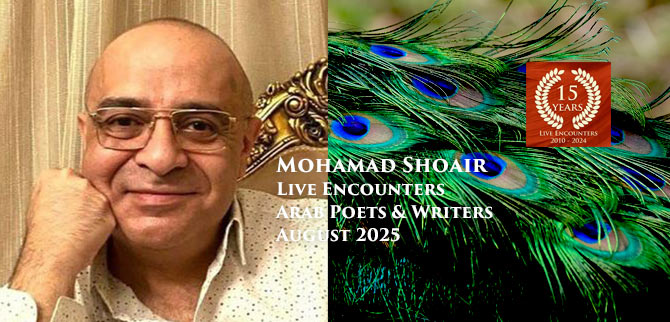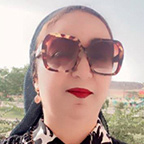
Live Encounters Poetry & Writing August 2025
The Train, poems by Mohamad Shoair.
Translated from Arabic by Dr. Salwa Gouda.
The Train
“The train won’t, by God, leave on time!” I shouted amidst my companions at the station, echoing Newton’s famous “Eureka!” cry – but without triumph or joy, only tension and disappointment.
Before uttering it, my eyes – with their annoying habit – had already meticulously scanned every detail around the train inside the station: the supposed last-minute preparations before departure, the elusive iron gates with no inspectors standing by to check tickets, the giant electronic screen whose one malfunctioning slot displayed our train’s number, and the intense seriousness etched on the train driver’s face as he busied himself with tasks that seemed important and urgent, yet all confined within the station. So when would the train leave?!
I let out that cry and didn’t look into my companions’ eyes to gauge their reaction. I leaned my back against a thick column jutting slightly from the station wall, raised my right hand to clutch my head, fumbling nervously until it nearly poked my eyes out.
One of my companions approached, patted my shoulder, and with a calm smile and a soft voice, looking straight into my eyes, said: “It was obvious from the moment we entered the station… I told you.” From the tangled emotions his words carried to me, I chose to feel consolation, not gloating, and reacted. I retorted, spewing the lava of my rapid breaths: “But this means we’ll be late… We’ll be late… We’ll be late!”
As the pitch and intensity of my voice rose with each repetition of the word, it seemed to me that it burst forth in circles of sound waves, rising and expanding, gradually dissipating into the void above the towering station building.
I had a sudden headache. I raised my hand to my head again, turning around amidst the noise. In the distance, to the left, I glimpsed the station door. Remnants of sunlight had stolen through it, looking bright outside.
Mr. Rational
On the metro car, he heard violent explosions from a game a young man was
playing on his phone… On the station platform, he nearly bumped into a girl
standing there, pouting her lips and taking a selfie as if she were alone… In the street, he saw a woman carrying a bag of tomatoes and cucumbers in one hand
and smiling into the phone in her other.
He wanted to stand in the middle of the road… and scream at the top of
his voice… saying: “We are idiots!”
But he…. didn’t do it.
He took out his phone… and wrote it on Facebook.
Deaths
By the time he finished his coffee, he had woven his idea… He thought and
calculated… How brilliantly he calculated!
Why kill her? Leave her, she’ll die on her own. Relationships impose themselves
on your life… Years and years gnaw at you with the sword of your own propriety… They invade you. Rule you. Direct you… And with the weapon of your own morals, they demolish your fortresses… Why kill her? Why stain your hand with her blood?! A period passed, then the newspapers published the news: “Forensic report clarifies multiple deaths caused by suffocation due to toxic gas of indifference.”
© Mohamad Shoair
Mohamad Shoair is an Egyptian journalist and novelist. From 2000 to 2018, he published five works of literary non-fiction exploring politics, journalism, and social media. Shifting his focus to fiction, he subsequently released the novels Plan 51 (2021) and Sugar Factory (2023). His journalistic work earned him the Egyptian Journalists Syndicate’s Best Political Article Award in 2018.
 Translated by Dr. Salwa Gouda, who is an accomplished Egyptian literary translator, critic, and academic affiliated with the English Language and Literature Department at Ain Shams University. Holding a PhD in English literature and criticism, Dr. Gouda pursued her education at both Ain Shams University and California State University, San Bernardino.
Translated by Dr. Salwa Gouda, who is an accomplished Egyptian literary translator, critic, and academic affiliated with the English Language and Literature Department at Ain Shams University. Holding a PhD in English literature and criticism, Dr. Gouda pursued her education at both Ain Shams University and California State University, San Bernardino.
She has authored several academic works, including Lectures in English Poetry and Introduction to Modern Literary Criticism, among others. Dr. Gouda also played a significant role in translating The Arab Encyclopedia for Pioneers, a comprehensive project featuring poets, philosophers, historians, and literary figures, conducted under the auspices of UNESCO. Recently, her poetry translations have been featured in a poetry anthology published by Alien Buddha Press in Arizona, USA. Her work has also appeared in numerous international literary magazines, further solidifying her contributions to the field of literary translation and criticism.

